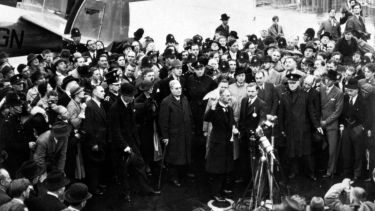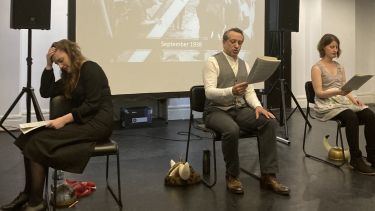New approaches to teaching the History of Appeasement in the classroom - Teachers' Conference
This Teachers' Conference will explore new approaches to teaching the history of appeasement in the classroom. It is taking place on Wednesday 7 June 2023 at the University of Sheffield. Organised by Professor Julie Gottlieb, Dr Hallam Roffey, and Andrew Wrenn.

About the conference
Welcome to our free Teacher’s Conference, where we will together be exploring new approaches to teaching the history of appeasement in the classroom. The history of appeasement, the successes and failures of peace initiatives in International Relations, and the social history of World War II are popular topics at Key Stage 3, GCSE and A-level. They are, however, taught mainly from the perspective of history from above, with little regard for the psychological, personal, and popular experiences of living in times of acute international crisis, and the ways in which we all inevitably internalise the failures of peace.
Bringing together a dynamic team of partners from schools, the Historical Association, the Mass-Observation Archive, playwright and actors, and academic historians, this one-day conference will road-test new teaching materials, support teaching innovation, provide CPD, and generate discussion and collaboration.
Itinerary
11.00-11.10: Welcome and Introduction
11.10-11.55: Scholarship
Professor Julie Gottlieb will lead this session, offering a state of the art of the historiography of appeasement and the coming of WWII (British and international perspectives). She will then introduce new directions in the scholarship.
The Munich Crisis and foreign policy in the 1930s was long stuck in certain methodological ruts, and studied as high politics, diplomatic history and International Relations. More recently, the perspectives of transnationalism, gender, race, history from below and the history of emotions have suggested exciting and timely new interpretations of the crisis.
Drawing on Gottlieb’s own research-led teaching on the subject, she will outline innovative paradigms and methods for rethinking the history of international relations that can inform and refresh Key Stage 3, 4 and 5 curriculum.
12-12.50: Sources
Led by Suzanne Rose (University of Sussex) Mass Observation Engagement Manager, Mass Observation Archive.
The archives of Mass-Observation provides one of the richest collection of sources for the study of the social history of Britain in this period. Launched in 1937, Mass-Observation was a social research organisation that aspired to provide “an anthropology of ourselves”, and give voice to and preserve the thoughts, behaviours, habits and customs of ordinary people.
The M-O archive is especially relevant for a study of the Munich Crisis from the point of view of a history from below. The organisation carried out extensive research in a number of experimental modes (straw polls and surveys, listening in, and directive replies) to capture how the population as a whole responded to the escalating international crisis and was preparing, materially and psychologically, for war.
Suzanne will provide an introduction to the Mass Observation Archive and help develop understanding about the nature of the collection, the ways in which it can enhance teaching and learning and the opportunities and support the MO archive can provide for schools to engage with the archive.
12.50-1.45: Lunch
Lunch will be provided.
1.45-2.30: Study
Chaired by Andrew Wrenn (HA Fellow and Education Consultant), in this session we will hear from teachers about their experience and practice teaching this subject matter at different levels.
A number of teachers have been road-testing sources, curriculum, and immersive exercises co-created with the University of Sheffield team. In collaboration with the Historical Association, we are curating a web-based package of teaching material. We are eager to have your input to be able to deliver material that will align with your school’s curriculum and provide enrichment to your teaching.
2.30-2.45: Coffee Break
2.45-3.30: Stage
This session will be led by playwright and director Nicola Baldwin, who dramatized F.L. Lucas's Journal Under the Terror, 1938 (1939) as “The Nervous State”, working together with Julie Gottlieb as the historical consultant. One of the most innovative aspects of “New Approaches to Teaching Appeasement in the Classroom” is the use of historical dramatisation to make the study of the Munich Crisis and the coming of WWII relevant, relatable, and resonant for teachers and their students.
In this session, we will hear about the experience of working with students and their teachers at the event on 19 April 2023, as well as introduce a number of immersive exercises and approaches that use drama to deepen historical understanding.
“The Nervous State” dramatises classical scholar, anti-appeasement polemicist, prolific writer and Bloomsburite F.L. Lucas’s Journal Under the Terror, 1938 (1939), a largely forgotten published diary that gives vivid insight to the psychological impact of the accelerating international crisis on both Lucas and his wife Prudence.
We will discuss the emergence of this collaborative project, as well as the practical ways in which “The Nervous State” can further enhance teaching appeasement in the classroom through immersive exercises.
Please see the film about the making of “The Nervous State”
3.30-3.45: Conclusions and suggestions for next steps
Venue
The Diamond - 32 Leavygreave Road, Sheffield S3 7RD - Workroom 2 (ground floor)
Booking
To book your place, please complete the online booking form and we will contact you within 5 working days to confirm your booking. Places are limited, so we would advise that you book early.
Contact
If you have any questions regarding the event, please contact Hallam Roffey, Project Officer: hroffey1@sheffield.ac.uk

